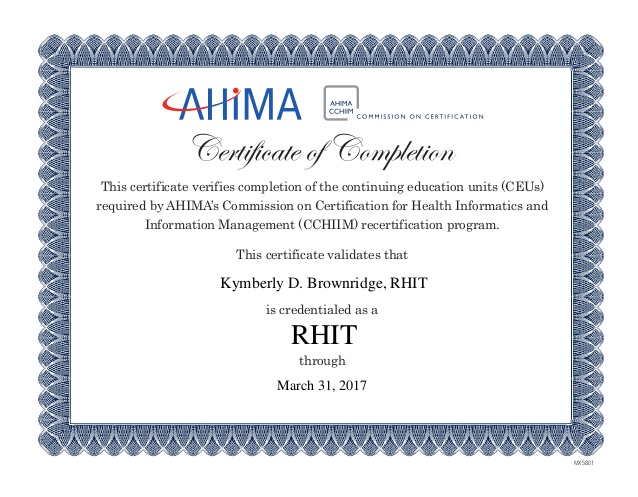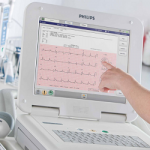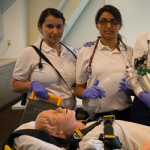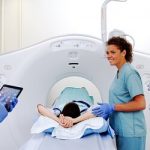What is a Registered Health Information Technician
A Registered Health Information Technician will work in many different types of medical facilities including:
- Hospitals
- Nursing homes
- Doctors’ offices
- Home health agencies
- Mental health facilities
The main goal of a Registered Health Information Technician is to keep patients’ documents safe in the computer system.
Often considered the backbone of the medical field, Registered Health Information Technicians work tirelessly to make sure all patient information is kept safe and where it should be.
Due to the security elements of this career, most Registered Health Information Technicians will earn an Associate’s degree in order to find employment.
Those with medical, coding and computer knowledge will do best in this field.
Duties
As a Registered Health Information Technician, you’ll learn many medical terms and billing codes in order to maintain patient records.
Along with ensuring the safety of patient information, a Registered Health Information Technician is also tasked with:
- Verifying the accuracy of medical records
- Assembling and analyzing patient information
- Helping to improve patient care
- Deciding on costs and controlling them
- Coding diagnoses and procedures
- Cancer registrars
Salary
As a Registered Health Information Technician, you can expect to make almost $51,840 a year on average.
Those who have just started their career as a Registered Health Information Technician should expect a salary closer to $29,130 to start.
But with time and experience, you can make over $105,690 working as a Registered Health Information Technician.
Those who work in larger populations, such as Washington DC and California, can make close to $60,000 a year as a Registered Health Information Technician.
While those working in smaller populations like Kansas and Illinois will make closer to $40,000 a year.
Maintaining certification and keeping up with trends in technology and medicine will help you gain promotions and raises in this field.
Annually National Average Salary: $73,410
Average Annual Salary by State
| State | Avg. Annual Salary |
|---|---|
| Alabama | $52,900 |
| Alaska | $68,730 |
| Arizona | $55,470 |
| Arkansas | $66,060 |
| California | $104,800 |
| Connecticut | $65,050 |
| Delaware | $67,500 |
| District of Columbia | $85,130 |
| Florida | $74,000 |
| Georgia | $67,130 |
| Hawaii | $67,690 |
| Idaho | $56,930 |
| Illinois | $62,450 |
| Indiana | $53,670 |
| Iowa | $72,280 |
| Kansas | $71,560 |
| Kentucky | $63,440 |
| Louisiana | $57,030 |
| Maine | $71,710 |
| Maryland | $83,540 |
| Massachusetts | $87,240 |
| Michigan | $67,510 |
| Minnesota | $85,760 |
| Mississippi | $49,590 |
| Missouri | $60,150 |
| Montana | $78,850 |
| Nebraska | $59,610 |
| Nevada | $62,620 |
| New Hampshire | $77,150 |
| New Jersey | $77,960 |
| New Mexico | $45,510 |
| New York | $82,810 |
| North Carolina | $64,750 |
| North Dakota | $72,110 |
| Ohio | $69,950 |
| Oklahoma | $46,840 |
| Oregon | $93,160 |
| Pennsylvania | $68,110 |
| Rhode Island | $84,180 |
| South Carolina | $48,740 |
| South Dakota | $62,000 |
| Tennessee | $67,980 |
| Texas | $78,150 |
| Utah | $72,550 |
| Vermont | $79,550 |
| Virginia | $61,710 |
| Washington | $67,800 |
| West Virginia | $56,880 |
| Wisconsin | $71,320 |
| Wyoming | $82,490 |
| Puerto Rico | $29,770 |
Annual Average Salary: Top 5 States
The top earning state in the field is California, where the average salary is $104,800.
These are the top 5 earning states in the field:
* Employment conditions in your area may vary.
How to Become a Registered Health Information Technician
Step 1 Earn an Associates Degree
You won’t be able to find many careers as a Registered Health Information Technician without having at least an Associate’s degree.
There are some online classes and courses in technical schools that may take around one year to finish, but be wary of these because they may not offer the proper education or they may not be accredited.
Most Associate’s degree programs across the United States are accredited for Registered Health Information Technicians and will take around two years to finish.
Math and science courses will fill your days in a program to become a Health Information Technician.
Some of the types of classes to expect in this type of program include:
- Health Insurance and Reimbursement
- Code Compiling
- Health Services and Information Systems
- Ethics and principles of Health Information Management
- Disease Coding
You will be required to learn medical terminology and anatomy in these types of programs as well.
Many Associate’s degree programs will provide an externship for Health Information Technicians in order to gain hands-on experience while also getting course credit.
If your program does not offer an externship, you can find opportunities to volunteer or shadow Registered Health Information Technicians in your area to get acquainted with the career.
Step 2 Become Licensed
Once you have a degree, many states will require that you become licensed as a Health Information Technician.
After you take the exam, given by the American Health Information Management Association, you will gain licensure and become registered in the state you will work.
This certification will allow you to become a Registered Health Information Technician.
The exam to earn this credential can take up to 3 and a half hours to finish, and will offer questions on subjects like:
- Access and Disclosure
- Security and Privacy
- Compliance
- Data Analysis
- Data Content and Structure
Having a certification as a Registered Health Information Technician will show employers that you are serious about the career and that you will do a good job in this role.
Step 3 Gain Experience
Once you have all of your proper education and are ready to step into the workforce, it’s important to have hands-on experience.
Knowledge through doing is vital in the career of a Registered Health Information Technician.
Having at least two years of experience working in this career will allow for promotions and raises, as well as other doors opening to new job opportunities.
Some of the types of careers you can expect to gain through experience and education as a Registered Health Information Technician include:
- Health Information Management
- Health Information Technology
- Health Informatics
These careers may sound the same, but they do have some unique differences.
As a Health Information Manager, you will work with doctors and the IT department as a bridge between the two.
As a Health Information Technologist, you could work as a medical coder or medical billing clerk.
With Health Informatics, you will work in the IT department behind the scenes rather than in the office.
As you work in this field, you will find your niche and can then decide what route you want to take.
Step 4 Maintain Certification
There are reasons that you must have certification in order to work as a Registered Health Information Technician.
One of the main reasons is that security is important for patient records, and maintaining that security is crucial.
Due to the seriousness of the field, a Registered Health Information Technician should renew their certification every couple of years.
This can be done by retaking the exam, or by showing proof of further education as a Registered Health Information Technician.
Some of the things that you can do to further your education include:
- Attending computer technology classes
- Webinars and seminars
- Attending conferences and meetings
- Attending pharmaceutical classes
Popular Programs
Education
Those who desire to work as a Registered Health Information Technician will need to have at least an Associate’s degree to get hired in most facilities.
The average Associate’s degree takes about two years to finish, many programs can also be found online that can take less than 24 months.
The courses that you should take in this type of program should be based on science and computers.
The types of classes you should expect to have in a Health Information Technician program include:
- Anatomy and Physiology
- Medical Terminology
- Healthcare Computer Systems
- Health Data Requirements
- Healthcare Coding Systems
- CPT Coding
- Disease and Diagnosis Coding
- Medical Insurance and Reimbursement
You should have great computer skills in order to do well in this career.
There may be some employers that require a Registered Health Information Technician to have a Bachelor’s degree.
Most Bachelor’s degrees can take another 2 to 4 years to complete, depending on if your credits transfer from your Associate’s degree.
You can expect to delve deeper into the world of Healthcare Information with this type of degree.
The courses that should be on your agenda include:
- Data Management
- Electronic Health Records
- Network Technology
- Information Security
- Privacy and Ethics
Having more education can increase the likelihood of promotions and raises.
Some of the types of careers you should expect with a Bachelors degree in this field include:
- Health Information Manager
- Medical Coder
- Coding Compliance Auditor
- Data Analyst
- Clinical Documentation Specialist
- Medical Research Analyst
Along with formal education, many Registered Health Information Technicians take courses to learn more about electronic health records, advancements in technology, and computer-related classes.
Most certifications require some type of formal education in order to gain the credential.
Also, many employers require Registered Health Information Technicians to have at least two years of education and hands-on experience before offering employment.
Video About The Career
Certification and Licensing
In the United States, most Registered Health Information Technicians become certified in the field.
This certification is given through the American Health Information Management Association.
In order to become a Registered Health Information Technician, you need to pass the exam.
This exam costs about $300 to apply for, and you can gain membership in the American Health Information Management Association upon completion of certification.
Other requirements to become certified with the AHIMA include:
- Completion of an accredited program
- Have at least a 2.5 GPA
- Payment of the enrollment fee
The RHIT exam is timed and is capped at three and a half hours.
There are typically between 130 and 160 questions on the exam.
Those who are interested in taking this exam can take it online as well as at certain trades schools and community colleges across the country.
There is a four-month window between when you register for this exam and when you take it.
Those who do not take the exam within four months will need to reapply and possibly pay the fee once more.
In order to pass the exam, you will need a score of 300.
This exam will cover many topics, some of the areas to study include:
- Data Content, Structure, and Information Governance
- Data Analytics and Use
- Compliance
- Leadership
- Access and Disclosure
- Privacy and Security
Once you gain this certification, you will need to renew it every two years or risk being audited.
There are many ways to become recertified as a Registered Health Information Technician.
Some of the ways that you can show that you’re still succeeding in this career include:
- Education Programs
- Webinars
- Seminars
- Exam item writing
- Directing clinical practice
Having certification as a Registered Health Information Technician will set you apart from those with no credentials.
Being registered means that you are legally able to work in the United States.
Certification Example:

Average Training Program Duration: 2-4 Years
On average, a program to become a Health Information Technician will take anywhere from 21-24 months.
Having an Associate’s degree will help you gain employment later, which can take 2 years as well.
Those who want to gain even more education can earn a Bachelor’s degree.
This takes another 2-4 years, depending on your credits and if they transfer.
There are many options when it comes to education and becoming a Registered Health Information Technician.
It takes anywhere from 2-4 years to become a Registered Health Information Technician.
Job Outlook
Finding a job for a Registered Health Information Technician shouldn’t be hard in the near future.
This career will grow around 9 percent over the next ten years, which is much higher than many other careers in the medical field.
The reason for this rise in job opportunities is because the baby boomer population is growing older, and will need more medical care, as well as technological advancements that continue to come about.
With proper certification and licensing, a Registered Health Information Technician with two or more years of experience can find great career prospects now and in the future.
Employment Growth Projection: 16%
2023
2033
That's a higher than average projected growth of 6,400
Should You Become a Registered Health Information Technician?
Overall Satisfaction: High

People who work as a Registered Health Information Technician say that they enjoy their career.
The perks of this job are that you will be helping people, and working closely with others to make sure patients are safe and well taken care of.
Those who have a high computer and technical skills will likely have more success as a Registered Health Information Technician.
This is because you will be working with computers and coding much of the day, and it’s important to make no mistakes.
The hours are good for this career, as most Registered Health Information Technicians work a 9-5 shift.
Average Salary: High

Having a career as a Registered Health Information Technician means that you could have a salary of around $51,840 a year on average.
Building a career in this field with experience and education can grant you promotions and raises, up to $105,690 a year in some areas.
That doesn’t necessarily mean you will make that much to start, in the beginning, most Registered Health Information Technicians make closer to $29,130 a year.
Gaining certification and maintaining education on computers and technology will get you far in this career.
If you want to gain more salary, consider working in larger populations or in larger hospitals rather than small doctors’ offices.
Job Growth Outlook: High

With advancements in technology popping up more and more every day, the use of Registered Health Information Technicians in hospitals and other medical facilities will grow around 9 percent in the next ten years.
This means that if you are interested in becoming a Registered Health Information Technician, now is the time to start your journey.
Along with technological advancements, the aging baby boomer population will make this career grow as well.
The necessity for more medical care will require Registered Health Information Technicians to ensure information is not compromised.
Those with certification and proper licensing will have the most job prospects in this career.
Education Duration: 2-4 Years

In order to work as a Registered Health Information Technician, you’ll need to have a basic understanding of computers, coding, and the medical field.
Proper education for a Registered Health Information Technician will likely consist of earning an Associate’s degree.
This type of degree can take around two years to finish but can offer many opportunities to a Registered Health Information Technician.
There are some Registered Health Information Technicians who choose to earn a Bachelor’s degree, which can take another 2-4 years.
Once you earn a degree, it’s important to become licensed.
This can take several months more, depending on when you take the exam.
Personal Skills Needed

Along with coding and computer skills, a Registered Health Information Technician needs to have compassion for others, and a need to help people.
As a Registered Health Information Technician, you will be expected to keep patient files safe and discreet, which means that you will need the following skills:
- Analytical skills
- Ability to see small details
- Organizational skills
- Integrity
- Ability to work as a team or alone
- Communication skills
- Math and science skills
- Trustworthiness
- Ability to work quickly and efficiently
Frequently Asked Questions
How much does a Registered Health Information Technician make?
Most Registered Health Information Technicians working in the United States make close to $51,840 a year.
Having a degree and certification can lead to a salary of over $105,690 in some larger hospitals and states.
Those who are just beginning their career as a Registered Health Information Technician will make a salary closer to $29,130 to start.
Hands-on experience and technological skills can provide access to more job opportunities as well as raises and promotions.
How long does it take to become a Registered Health Information Technician?
The time that it takes to become a Registered Health Information Technician is up to you.
There are some programs that require a year of your time, however, most Registered Health Information Technicians prefer to earn an Associate’s degree.
An Associate’s degree may take up to two years, and then you will be required to take an exam to become registered and certified.
This exam must be taken within four months of applying, but that is up to you to determine.
If you decide that you want to gain more education, a Bachelor’s degree can take another 2-4 years, depending on your school.
What does a Registered Health Information Technician do?
With this career, you should expect to know a lot about computers and technology.
As a Registered Health Information Technician, you will work behind the scenes with medical records.
The duties of a Registered Health Information Technician include:
- Ensuring the safety of patient records
- Improving patient care
- Ensuring all documents are in the correct place
- Coding medical terminology
Science and math skills are great skills to have in this career.
What is the demand for Registered Health Information Technicians?
Over the next decade or so, the job opportunities for Registered Health Information Technicians will grow by about 9 percent.
This is quite a lot for the medical field, thanks to advancements in technology and medical care.
Finding a job as a Registered Health Information Technician will be easier for those who have certification and proper education.
Most employers won’t hire someone without education nowadays, so the demand will increase even more.
How much does it cost to become a Registered Health Information Technician?
If you are interested in becoming a Registered Health Information Technician, then you may be curious about the cost.
Most Associates degrees cost anywhere from $10,000 to $15,000 across the country.
However, if you plan to earn a Bachelor’s degree, this can cost another $15,000 to $35,000.
Earning a certification can cost an additional $500.
This means that it can cost anywhere from $10,500 to over $40,000 to become a Registered Health Information Technician.
Registered Health Information Technician Resources
- 15 Pros and Cons of Being an RHIT (Registered Health Information Technician)
- Best Online RHIT Training Programs
- How Much Does It Cost to Become a Registered Health Information Technician?
More Medical Careers
| Career | |
|---|---|
 | Certified Nursing Assistant Working as a Certified Nursing Assistant is an entry-level role that will give you hands-on experience when you are ready to take the next step in your medical career. |
 | Dental Assistant Dental assistants help dentists to provide patient care, keep records, and care for the dental equipment. |
 | Dental Hygienist Dental hygienists take care of cleaning teeth to promote hygiene and help avoid cavities and gum problems. |
 | Dialysis Technician Dialysis technicians maintain and monitor dialysis equipment, and also act as primary caregivers for patients undergoing dialysis treatment. |
 | Dog Groomer Dog groomers attend to grooming dogs, usually at dog salons or big pet-related chain stores. |
 | Healthcare Administrator Healthcare administrators – also known as healthcare executives or health services managers – are responsible for the planning, direction, and coordination of medical and health services. |
 | Home Health Aide Home health aides provide home care to individuals who require assistance in their day-to-day living. |
 | Licensed Practical Nurse (LPN) Licensed Practical Nurses provide basic nursing care to patients and work with Registered Nurses and Doctors. |
 | Medical Assistant Medical assistants support the work of physicians, nurses, and other health professionals. |
 | Medical Biller and Coder Medical billers and coders manage, organize, and code various health information data. |
 | Medical Technologist Medical laboratory technologists collect bodily samples and conduct tests to analyze those samples. |
 | Medical Transcriptionist Medical transcriptionists go over voice recordings to convert them into written texts. |
 | Nutritionist As a Nutritionist, you’ll be tasked with creating meal plans, counseling, and understanding dietary restrictions for all types of clients. |
 | Patient Access Representative The work involves helping people to orient themselves to the space and everything that is going on. |
 | Patient Care Technician Patient care techs work directly with patients helping them with daily activities and assist the medical staff by measuring and monitoring the patients' vital signs among other tasks. |
 | Pharmacy Technician Pharmacy technicians provide patients with medications through prescription or over the counter. |
 | Phlebotomist As a Phlebotomist, it will be your responsibility to take blood samples from patients and send them to the lab for further testing. |
 | Physical Therapist Assistant Physical therapist assistants provide physical therapy services to patients and aide to physical therapists. |
 | Professional Recovery Coach A professional recovery coach is a life coach who works with someone during their addiction recovery process. |
 | Radiation Therapist Allied health provisional who specializes in radiation oncology treatments. |
 | Registered Nurse (RN) Registered Nurses provide hands-on patient care in various settings, mainly hospitals, and clinics. |
 | Respiratory Therapist Respiratory therapists treat and care for patients who experience breathing difficulties. |
 | Sterile Processing Technician A sterile processing technician is a healthcare professional who is responsible for preparing, sterilizing, maintaining, packaging, and storing medical tools and equipment used in surgical and other medical procedures. |
 | Surgical Technologist Surgical technologists – also known as operating room techs – prepare operating rooms and assist doctors and nurses during surgical procedures. |
 | Vet Office Manager Veterinary office managers work to make sure that the daily operations run smoothly and efficiently at veterinary hospitals or veterinary clinics. |
 | Veterinary Assistant Veterinary Assistants work closely with Veterinarians to handle routine animal care. |
 | Veterinary Technician Veterinary Technicians assist veterinarians as well as diagnosing and treating animals, mostly in private clinics. |
 | EKG Technician EKG technicians test and monitor the cardiovascular system. |
 | EMT Trained emergency medical technician that arrives at the scene to provide medical services such as resuscitation. |
 | MRI Technologist MRI Technologists use a machine to scan the body and create a detailed image of the inside for doctors to analyze. |
 | Optician Opticians are technicians and salespersons at the same time who spends most of their day talking to customers, reading prescriptions written by doctors, and dispensing glasses and lenses. |
 | Ultrasound Technician Ultrasound technicians aid physicians in monitoring and diagnosing patients through the use of ultrasonic imaging technology. |
 | X-Ray Technician X-Ray Technicians are medical imaging professionals who use technology to visualize the inside of our bodies. |













